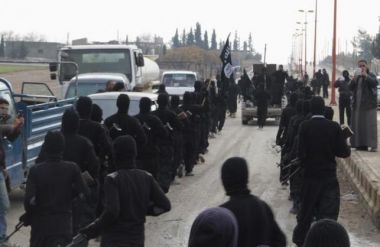ISIS armed with huge arsenal of weapons, mostly from captured stockpiles in Iraq and Syria — Amnesty International

The Islamic State (ISIS) is armed with various types of weapons indirectly supplied by at least 25 countries, including those that are fighting the jihadist group, according to a new report released by Amnesty International.
The 44-page report titled "Taking Stock: The Arming of Islamic State" released late Monday said the extremist group has built a substantial arsenal, many of which are equipment and munitions from stockpiles captured from the U.S.-allied Iraqi military and Syrian opposition groups, CNN reported.
It said that after capturing Iraq's second largest city Mosul in 2014, ISIS militants were able to acquire "a windfall of internationally manufactured arms from Iraqi stockpiles, including U.S.-manufactured weapons and military vehicles.''
These weapons were reportedly designed or manufactured in 25 countries and range from assault rifles to tanks and anti-aircraft defence systems.
"The bulk of ISIS' arsenal is made up of older Soviet-era weapons brought into Iraq during the Iraq-Iran War and the U.S. occupation between 2003 and 2007. The main suppliers of Iraq historically have been Russia, China and the U.S.," Patrick Wilcken, the report's author told CNN.
"It is mainly old stock, but they do have some more sophisticated weaponries that were more recently manufactured," he added.
Among the advanced weaponry in the ISIS arsenal are man-portable air defence systems (MANPADS), guided anti-tanked missiles and armoured fighting vehicles, as well as assault rifles like the Russian and Chinese-produced Kalashnikov series, the US M16 and Bushmaster, and other guns manufactured in Germany, Croatia and Belgium, the report states.
"The vast and varied weaponry being used by the armed group calling itself ISIS is a textbook case of how reckless arms trading fuelled atrocities on the massive scale,'' Wilcken noted.
ISIS has also gained access to weapons through the capture or sale of Syrian military stocks supplied to armed opposition groups in Syria by countries including Turkey, the Gulf states and the U.S., Amnesty said.
The findings come as President Barack Obama has recommitted to leaning on regional forces, including the Iraqis, Kurds and Syrian opposition, to try to wipe out ISIS rather than committing significant numbers of U.S. ground troops.
These regional forces will receive assistance in the form of weapons, backup via coalition airstrikes and training from U.S. special operations forces, Obama said.
But the Amnesty International report concluded that these local forces were the ones that had inadvertently contributed arms to ISIS.
"Decades of free-flowing arms into Iraq meant that when ISIS took control of these areas, they were like children in sweetshop. The fact that countries including the U.K. have ended up inadvertently arming ISIS should give us pause over current weapons deals,'' said Amnesty U.K.'s arms programme director Oliver Sprague.
"Risks need to be far more carefully calculated, and we shouldn't wait for this worst-case scenario to happen before acting to prevent sales of arms which could fuel atrocities,'' he stressed.











